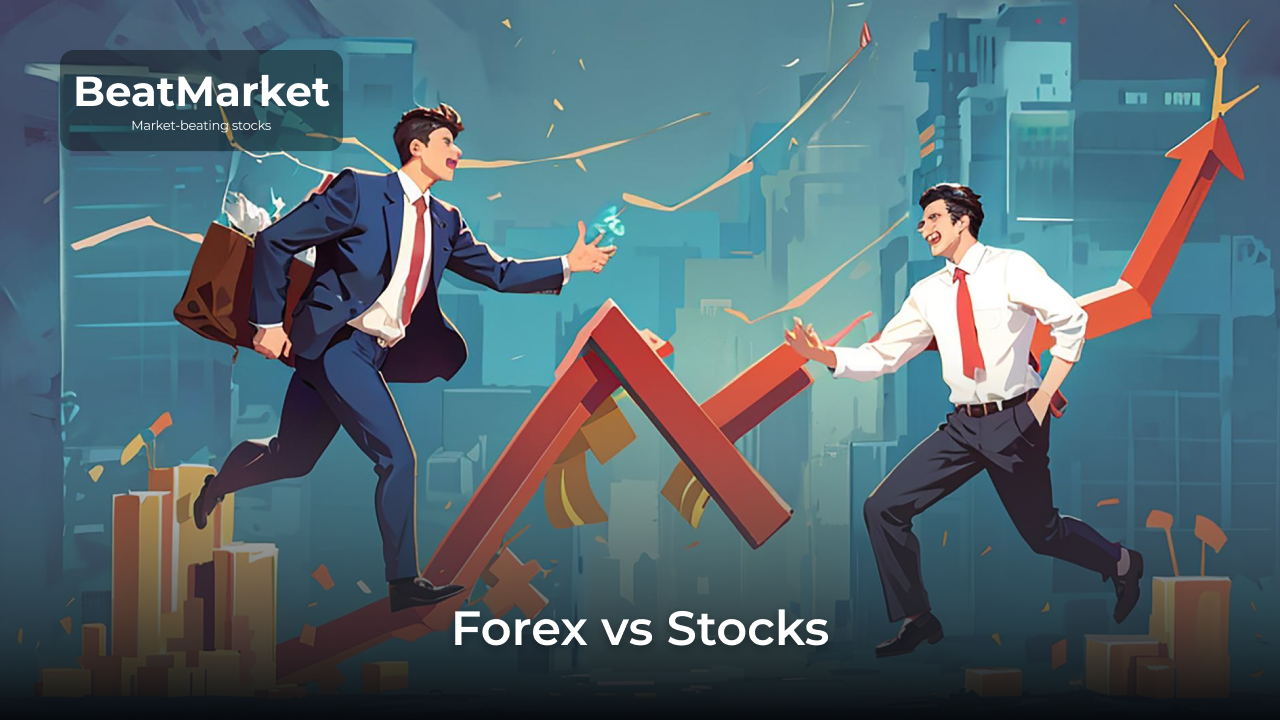- When comparing Forex vs the stock market, the former has several benefits. These include higher trading volume, greater liquidity, longer opening hours, and lower commissions.
- Forex trading’s suitability depends on the trading strategy. It is most appropriate for day traders.
- The stock market differs from Forex in its potential for passive income.
Table of Contents
What is the forex market
Forex is short for foreign exchange. It is an international interbank currency market where one currency is exchanged for another.
The main characteristic of the market is its huge trading volumes. Sometimes, the total turnover per day exceeds $7 trillion. This is due to the presence of major players such as central and private banks, and investment funds.
Other important characteristics include:
- High liquidity. Order execution is almost instantaneous.
- Availability. Trading is available nearly 24 hours a day, seven days a week.
- Quotations are made unambiguous through high liquidity. It is unlikely for a deal to be closed in parts at different prices.
Supply and demand determine exchange rates. Fluctuations cannot be limited by any regulator, and there is no central location for processing transaction information.
Forex is a virtual trading platform where users bet on changes in exchange rates. Forex brokers provide access to the platform, giving private traders with small capital an opportunity to earn on the currency market.
The platform offers trading of not only currency pairs but also CFD contracts on stocks, metals, and other instruments.
What is the stock market?
The stock market is where securities, such as stocks, are traded. When an investor buys stocks, they acquire a small share in the company’s business and can claim a portion of the profits in the form of dividends. Additionally, investors can participate in management by voting at shareholders’ meetings.
The investor acquires a real asset as a result of the transaction. They retain ownership in the event of unforeseen situations, such as the broker providing access to trading going out of business.
Securities of investment funds, bonds, and company shares are traded on the stock market. However, the volume of exchange trading is inferior to that of Forex, with only $200-300 billion compared to $7 trillion.
Signs of the stock market:
- The trading process is electronic, but all information processing occurs on a centralized platform;
- only assets that meet the requirements are eligible for trading;
- market participants’ activities are closely monitored.
The exchange has limited working hours, and trading 24 hours a day is not possible.
Forex vs stocks: Key Differences
A comparison of the foreign exchange market vs the stock market can be helpful in determining which option is better for you.
Consider the following key factors:
- volume;
- liquidity;
- volatility;
- hours of operation;
- leverage opportunities;
- compliance with the trader’s goals.
Forex trading has two key advantages: high transaction volumes and liquidity. The number of assets is no less important. Additionally, Forex brokers provide access to hundreds of currency pairs and the opportunity to use large leverage. Trading f is available around the clock.
However, not all day traders should choose the Forex market. Some prefer to trade with a small deposit and a limited number of assets, without the need for the wide range of opportunities that Forex provides.
Market Trading Hours
Forex trading is available 24/5, while stock exchanges are open for 8 hours or less.
For instance, Nasdaq trading hours start at 9:30 am ET and end at 4:00 pm Eastern Time. Some brokers offer pre-market and post-market access, allowing trading from 4:00 am to 8:00 pm. However, liquidity is lower and spreads are higher outside the main session.
Differences in trading hours can affect risk management, especially for those who hold positions for several days or weeks.
When significant news is released while the stock exchange is closed, trading may open with a gap, which is a sharp jump in quotes up or down. This can result in traders experiencing a margin call.
The Forex market is traded 24 hours a day on weekdays. Gaps are only likely to occur after the weekend. Stop losses can help prevent a margin call at all other times.
Market Influences
The movements of currency pairs are determined by the balance of supply and demand, which in turn depends on the situation in the world. The Forex market is influenced by numerous economic factors that determine the strength of national currencies. Among these economic factors are:
- Economic statistics. Especially GDP and inflation rates.
- Political events. Such as elections.
- Trade balance between countries.
- Interest rates.
- The exchange rate is influenced by events in the financial markets that correlate with it. For instance, the Canadian dollar is heavily reliant on commodities.
The stock market is also influenced by macroeconomic factors. These include:
- inflation and interest rates;
- money supply;
- industrial production index;
- commodity markets.
However, for individual stocks, the macroeconomy takes a backseat. Unless there are major external crisis factors, the focus shifts to internal reasons, such as the company’s performance and the state of the industry.
Liquidity Differences
The trading volumes of the Forex vs stock markets differ, with Forex being superior by about 15-20 times. Forex is known for providing maximum liquidity, meaning that large volumes can be sold without affecting the asset’s price.
This improves the ease of trading. Forex traders need not fear a deviation between the planned and actual prices.
However, large volumes and liquidity are only significant for institutional players, such as banks and investment companies. It is unlikely that a private trader’s transactions will significantly impact the stock market. Stocks of highly capitalized companies are very liquid.
For example, the average trading volume in Apple stock is approximately $52 million. The average investor need not worry about being unable to close their position.
However, penny stocks, which are small capitalization companies, present a different situation. Trading them may lead to liquidity problems.
Volatility
Volatility measures the variability of the value of a currency, stock, or other asset. Higher volatility means greater potential profit and risk. Volatility is a temporary value that changes depending on the economic situation and news background.
The Forex market is not always more volatile than the stock market. Deals in the Forex market are riskier not because of large price fluctuations.
Forex traders often use high leverage to profit from small price movements. However, if they guess the wrong direction, they risk losing their deposit.
Leverage
Margin trading is possible on both the Forex and stock markets. However, the leverage is typically much higher in Forex trading. For instance, when purchasing stocks, a ratio of more than 5:1 is seldom used, whereas in Forex trading, it can be as high as 20:1 or even 100:1.
Higher leverage means higher risk. For instance, if a trader opens a trade without leverage and loses 10% of the invested amount, the losses would amount to 50% when trading with a leverage of 5:1. Therefore, beginners are not recommended to use the maximum opportunities offered by the broker.
When using leverage, it is important to consider the cost, especially if the trade is not closed on the same day. This cost is known as the cost of leverage in the stock market and as the cost of carrying positions overnight in forex.
Long/Short Positions
A long position involves buying with the expectation of price growth, while a short position involves selling leveraged assets to profit from falling prices. Exchange traders pay a commission to a broker to provide securities for short selling.
Not all assets may be sold short on the exchange and the regulator may restrict such transactions at any time.
There are no such restrictions when trading currencies. Forex traders can sell any currency pair, including EUR/USD. Selling EUR/USD is a bet on the dollar’s growth against the euro.
The forex market is more suitable for speculation and downside plays because, unlike the stock market, selling does not involve additional commissions.
Forex vs Stocks: Which to Trade?
When deciding between Forex and the stock market, the choice should depend on the trading goals and style. If a person is working with short term strategies and is looking to make a quick profit based on price movements, Forex is often the preferred option for day trading. It’s important to note that ownership of the asset is not a priority for these stock traders.
The stock market allows purchasing ownership rights to securities. It is primarily designed for long-term investing and receiving passive income in the form of dividends and coupons. Although day traders and speculators also participate, they make up a smaller percentage.
Experienced traders use diversification and trade on both markets. The stock market is used to build a long-term portfolio. Forex is used to make quick money on increased volatility.
Technical vs Fundamental Analysis
The most important tool of a Forex trader is technical analysis. Price patterns, trading volumes, indicator readings are taken into account. In this way it is possible to find the optimal point for “buying low and selling high”. But there is a possibility of false signals.
Technical analysis is also applicable to the stock market. However, long-term investors prefer fundamental analysis. It makes it possible to assess business performance. When selecting stocks, various multiples are taken into account. For example, the ratio of a company’s capitalization to its earnings.
FX Trade Volume
When comparing Forex to the stock market, the former wins in terms of daily trading volume. However, this is not always the case. It depends on the asset and the size of the trade.
If a trader wants to trade popular foreign currencies or blue chip stocks, their trades are unlikely to affect the market. For instance, Tesla stocks have an average daily stock trading volume of over $110 million for three months. Even deals worth tens of thousands of dollars will not significantly impact the stock price.
If you deal with large sums of money and plan to exotic currencies trading and unpopular assets, trading Forex may be the best option for you.
Forex Market Hours
The market has limited operating hours, which can force traders living in different time zones to trade at inconvenient times, such as late evenings or early mornings. The Forex market is available 24/5, making it preferable for working with foreign currencies.
There is a higher level of trading activity during the working hours of the major stock exchanges. For example, during European business hours, euro currency pairs are more liquid and less liquid at night.
FX Variety
Forex traders can trade a variety of currencies, which is determined by their broker. While some large companies offer hundreds of pairs, many are considered exotic.
Traders often focus on a few major pairs, requiring constant chart analysis and news monitoring.
Trading Forex has another strategy. Some Forex traders use robots to automatically search for signals across multiple instruments. This strategy can be affected by the number of available currency pairs.
The stock market has thousands of traded stocks. However, analyzing a large number of companies is not successful. It only scatters the trader’s attention.
Fees and Commission
Stock market trading incurs additional costs. The investor pays a commission for each transaction, which may be fixed or depend on the volume.
Some online brokers do not deduct commission when stock trading. However, they may charge additional fees for securities accounting services. Therefore, it is necessary to study the tariffs before concluding a contract.
Forex brokers typically do not charge a commission per transaction. Instead, they earn their income from the spread between the buy and sell prices of a currency pair. The value of the spread depends on the company’s policy and the asset selected.
Conclusion
Forex trading offers benefits such as high liquidity, extended hours of operation, and a wide range of currency pairs.
The stock market is considered less risky. Buying a stock makes the investor an owner and can provide passive income for years. Trading Forex typically involves day trading, rather than holding positions for several weeks. A trader’s profit is the result of their active actions.
Trading Forex requires a higher risk tolerance. Waiting out a decline in quotations for a long time is not possible. The probability of losing a deposit is lower on the stock market. This is primarily due to lower leverage.
To make a choice, a person should research both options. It is recommended to practice day trading skills on a demo account.
FAQs
Is it better to trade forex or stocks?
For passive income, use stock/bond investing. Making money quickly through day trading on the Forex market requires active actions and in-depth knowledge.
Is forex really profitable?
When comparing both Forex and the stock market, Forex is faster at generating profits. However, to make money, you need knowledge and a proven trading system. Beginner traders often lose money due to impatience and inexperience.
Is Forex harder to trade than stocks?
Forex trading is psychologically challenging. The high leverage increases the risk of mistakes, making it crucial to avoid waiting for a trend change and locking in a loss instead.
You Might Also Like
- MLP Investments: Understanding Dividend Stocks and How to Invest in Them
- How to Calculate Dividend Yield: A Step-by-Step Approach for Investors
- High Yield Monthly Dividend Stocks: How Qualified and Ordinary Dividends Are Taxed Differently






